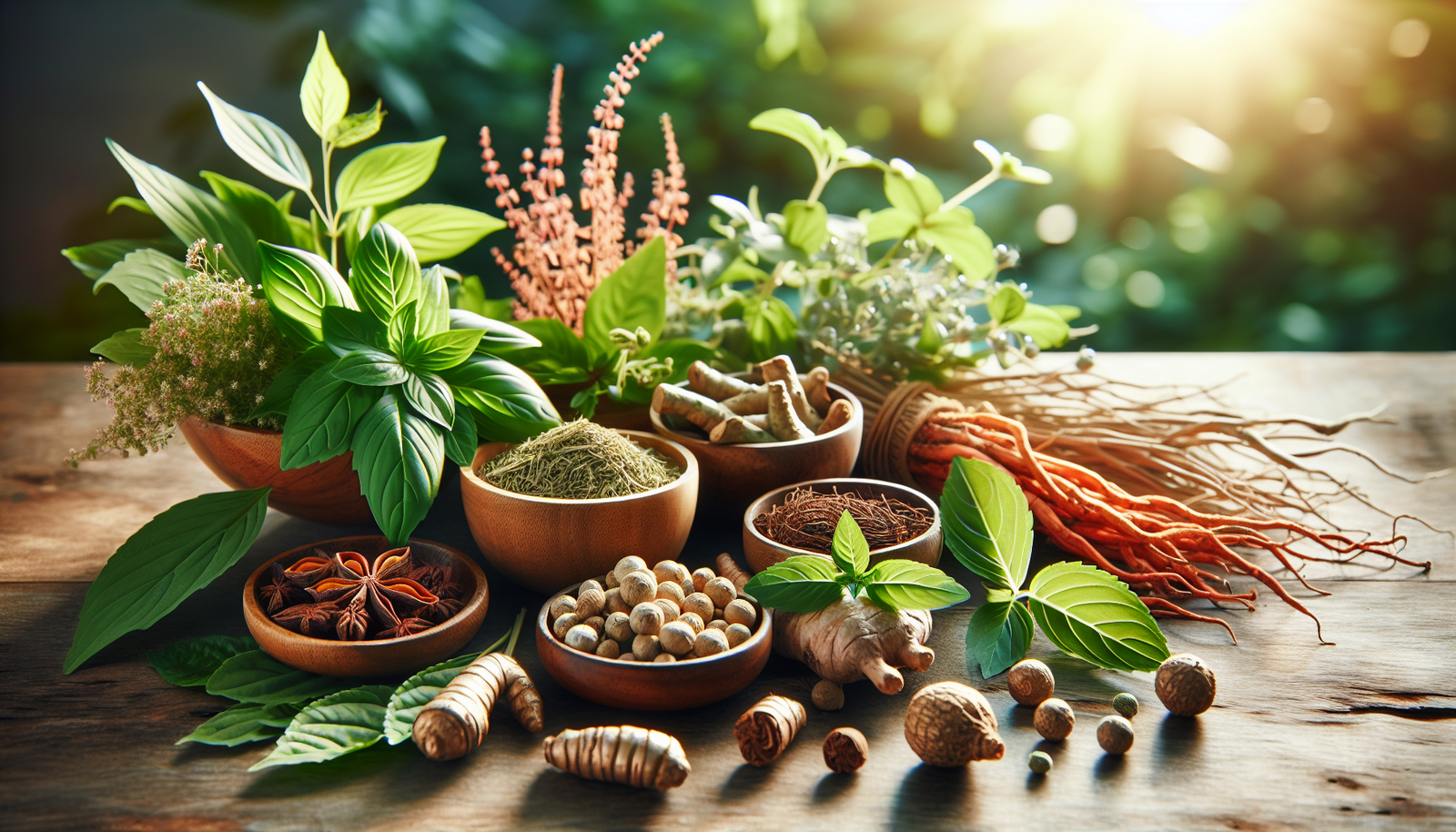Top Adaptogenic Herbs to Include in Your Daily Routine
Top Adaptogenic Herbs to Include in Your Daily Routine
Understanding Adaptogenic Herbs
Adaptogens are natural substances derived from plants that help the body adapt to stress and promote balance. These herbs regulate the body’s various systems, especially the endocrine system which regulates hormonesassociated with stress and homeostasis. By including adaptogenic herbs in your daily routine, you can improve your physical and mental well-being.
1. Ashwagandha (Withania somnifera)
Benefits:
Ashwagandha is one of the most well-known adaptogens, famous for its ability to reduce cortisol levels and combat stress. Studies have shown that it can improve anxiety, enhance mood, and boost overall cognitive function.
Usage:
Typically consumed in powder form, capsules, or as a tincture, the recommended dose is around 300-500 mg of a standardized extract per day. Pair it with warm milk or smoothies for better absorption.
2. Rhodiola Rosea
Benefits:
Rhodiola is another powerful adaptogen that helps enhance mental performance, particularly under stress. It is linked to improving endurance and reducing fatigue.
Usage:
Available as powders, capsules, or teas, an optimal dose is about 200-400 mg of a standardized extract. It is best taken in the morning to avoid any potential insomnia.
3. Holy Basil (Ocimum sanctum)
Benefits:
Also known as Tulsi, Holy Basil is revered for its ability to reduce stress, manage blood sugar levels, and enhance immune function. Its antioxidant properties combat oxidative stress in the body.
Usage:
Holy Basil can be consumed as a tea, essential oil, or extract. A typical dosage ranges from 300-2,000 mg per day depending on the form used.
4. Ginseng (Panax ginseng)
Benefits:
Ginseng is well-known for its energizing effects, helping to increase stamina, enhance cognitive function, and support the immune system. Its anti-fatigue properties make it an excellent choice for busy individuals.
Usage:
Commonly found in powder, tea, or capsule form, the recommended dosage is between 200-400 mg per day. Ginseng should be cycled for a few weeks at a time to maximize its benefits.
5. Maca Root (Lepidium meyenii)
Benefits:
Maca is a Peruvian root known for boosting energy, libido, and hormone balance. It helps improve mood and supports overall vitality.
Usage:
Maca is usually consumed in powder form, added to smoothies, yogurt, or baked goods. A dose of 1-3 teaspoons of Maca powder daily is commonly recommended.
6. Licorice Root (Glycyrrhiza glabra)
Benefits:
Licorice root is particularly effective in balancing cortisol and managing stress response. It is also known for its anti-inflammatory, immune-boosting, and digestive health benefits.
Usage:
It can be taken as a tea or in capsule form. The typical dosage is around 300 mg of a standardized extract per day. However, consult a healthcare provider if you have high blood pressure, as it may raise blood pressure levels.
7. Schisandra Berry (Schisandra chinensis)
Benefits:
Schisandra berries are known for their adaptogenic properties, enhancing mental clarity, endurance, and resistance to stress. They also provide liver protection and support skin health.
Usage:
Available in powders, tinctures, or capsules, the recommended dosage ranges from 500-1,000 mg per day. Incorporate it in smoothies or herbal teas for easy consumption.
8. Eleutherococcus (Eleuthero Root)
Benefits:
Often referred to as Siberian Ginseng, Eleutherococcus enhances physical performance and helps maintain mental clarity under stress. It is also known for its immune-supporting properties.
Usage:
The root can be consumed in capsules or tinctures. An effective dosage is between 300-600 mg per day, best taken earlier in the day to maximize energy throughout daily activities.
9. Reishi Mushroom (Ganoderma lucidum)
Benefits:
Reishi mushrooms are revered for their immune-boosting and anti-stress properties. They are effective in promoting restful sleep and balancing hormones.
Usage:
Reishi can be consumed as a tea, tincture, or powder. An appropriate dosage is 1,500-4,500 mg of powdered extract daily. Pair it with warm water or broth for comfort.
10. Cordyceps (Cordyceps militaris)
Benefits:
Cordyceps supports athletic performance and increases energy levels. It is also recognized for its antioxidant and anti-inflammatory effects.
Usage:
Available in capsule or powdered form, a typical dose is 1,000-3,000 mg per day. Blend it into smoothies or hot drinks for better integration into your diet.
11. Astragalus Root (Astragalus membranaceus)
Benefits:
Astragalus is known for its immune-boosting properties and for helping to combat fatigue. It protects against the stress of environmental changes and supports heart health.
Usage:
Astragalus can be consumed as a tincture, in capsules, or as a tea. A standard dosage is between 500-1,000 mg of extract per day.
12. Turmeric (Curcuma longa)
Benefits:
While primarily known as an anti-inflammatory herb, turmeric also possesses adaptogenic qualities that help the body deal with stress. Curcumin, its active compound, has significant benefits for brain health and mood regulation.
Usage:
Turmeric can be added as a spice to foods or taken in capsule form. For improved absorption, combine it with black pepper. A dosage of 500-1,500 mg per day is recommended, preferably with meals rich in healthy fats.
13. Gotu Kola (Centella asiatica)
Benefits:
Gotu Kola is known for its ability to enhance cognitive function, reduce anxiety, and improve overall mood. It’s particularly beneficial for those dealing with chronic stress.
Usage:
Typically found in capsules, teas, or tinctures, a daily dose of 500-1,000 mg is sufficient. It can be consumed in the evening for relaxation effects.
14. Poria Mushroom (Poria cocos)
Benefits:
Poria is used traditionally to promote relaxation, support digestive health, and strengthen the body’s stress response. It can also enhance sleep quality.
Usage:
Poria can be taken as a powdered supplement or in capsule form. A common dosage is between 1-3 grams per day.
15. Pine Bark Extract (Pycnogenol)
Benefits:
Pine bark extract is loaded with antioxidants and is known for enhancing circulation, reducing inflammation, and balancing stress response.
Usage:
This herb can be taken in capsule form. The recommended dosage is between 50-200 mg per day, often taken with meals.
Incorporating Adaptogens into Your Daily Routine
Integrating adaptogenic herbs into your daily life can be simple and enjoyable. Here’s how you can do it:
-
Smoothie Mix-Ins: Adding powdered adaptogens like maca or ashwagandha to your morning smoothies can enhance your nutrient intake while also providing stress relief.
-
Herbal Teas: Brew teas using holy basil, licorice root, or gotu kola for a soothing beverage that calms the mind.
-
Cooking: Incorporate spices like turmeric into your cooking for health benefits without compromising taste.
-
Capsules and Tinctures: For those short on time, capsule forms of adaptogens can be a quick and efficient way to reap their benefits.
- Mindful Consumption: Pair adults adaptogens with mindfulness practices such as yoga or meditation for a holistic approach to stress management.
Final Notes
Adaptogenic herbs offer a bounty of health benefits, especially for stress management and enhancing overall wellness. To achieve the best results, utilize these herbs as part of a balanced diet and healthy lifestyle. Before starting any new herbal regimen, it’s advisable to consult with a healthcare provider, especially if you’re pregnant, nursing, or taking prescription medications.
By exploring and incorporating these powerful herbal allies, you can craft a personalized approach to support resilience against daily stressors, ultimately fostering a more balanced and harmonious life.








